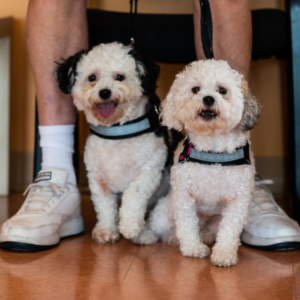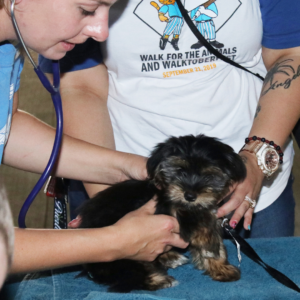Each year many of us celebrate Independence Day with friends and family; enjoying barbeques and lively firework shows. However, these traditions can frighten and at times be dangerous to your pets. Follow these useful tips to keep your pets safe during the festive summer holiday.
NEVER Use Fireworks Around Pets
- Lit fireworks can be extremely dangerous to pets. Sparks from the fireworks can cause severe burns and/or trauma to the face, paws, and skin.
- Never use fireworks around your pets as many types contain potentially toxic substances, including potassium nitrate, arsenic, and other heavy metals.
Leave Pets at Home
- While most humans enjoy summer parties, most pets do not. Loud noises, crowded areas, and unfamiliar settings, can frighten pets and cause them to become stressed and disoriented.
- For your pet’s safety, refrain from taking them to Fourth of July festivities, instead leave them at home, away from direct noises, in their own environment in which they feel safe.

Keep ID Current
- Loud noises from fireworks and other festivities may scare your pet and cause them to escape from your yard or home, if they are not safely enclosed. Be sure your pet is always wearing a collar with an ID tag that includes; your name, current phone number and any other relevant contact information.
- July 1 is National ID Your Pet Day, which serves as an annual check-in to make sure your pets’ identification tags and microchip information is up to date. Have your pet microchipped to increase the likelihood that they will be returned to you safely if a separation were to occur.
- Visit HumanePA.org to learn more about our Healthy Pets Initiative, which provides microchip services to keep pets safe and happy in their homes.
Avoid These Poison Hazards
Create Barbeque Boundaries
- Barbeques are a lot of fun, full of delicious foods and drinks…for humans. However, some of these items can be deadly to your pets. Be sure your pets can not get in to any alcoholic beverages. Also keep in mind that many human foods are not meant for pets, pet treats are always better to give your pets than human food, as human foods can cause severe digestive issues for pets.
- Be sure to avoid avocado, raisins, grapes, onions, chocolate and products with the sweetener xylitol.
No Glow Jewelry for Pets
- While it might look cute to put glow jewelry or glow sticks on your pets, the plastic and chemicals inside the tube are hazardous to pets if ingested.
- If your pet chews and/or swallows the plastic attachments or chemicals, they can be at risk for excessive drooling and gastrointestinal irritation, as well as intestinal blockage from swallowing large pieces of the plastic.
Safely Store Matches and Lighter Fluid
- Certain types of matches contain chlorates, which, if ingested, can be hazardous to pets. Lighter fluid, meanwhile, can be irritating to your pet’s skin, and, if swallowed, can cause gastrointestinal irritation, and other issues.
- Be sure to store all matches and lighter fluid in a safe place where pets cannot access the items by jumping or climbing.
If your pet ingest a poisonous substance, like the ones listed above, contact your veterinarian or the Pet Poison Helpline (800-213-6680) immediately. Do not induce vomiting or give anything orally to your pet unless specifically directed to do so by your veterinarian.



 There’s nothing more exciting to a pup than heading to the wide-open spaces of Humane Pennsylvania’s
There’s nothing more exciting to a pup than heading to the wide-open spaces of Humane Pennsylvania’s  Did you know that Humane Pennsylvania is a proud sponsor of the
Did you know that Humane Pennsylvania is a proud sponsor of the 
 The perfect way to show that you appreciate your pet is by
The perfect way to show that you appreciate your pet is by  The concept of the Walk-In Clinic grew out of HPA’s pioneering Healthy Pets Initiative, which provides meaningful access to veterinary care for all in need. This clinic was made possible through the visionary generosity of the Giorgi Family Foundation and Jay Rosenson, in memory of Eileen Rosenson. Their leadership is helping HPA build the best communities anywhere to be an animal or animal caretaker.
The concept of the Walk-In Clinic grew out of HPA’s pioneering Healthy Pets Initiative, which provides meaningful access to veterinary care for all in need. This clinic was made possible through the visionary generosity of the Giorgi Family Foundation and Jay Rosenson, in memory of Eileen Rosenson. Their leadership is helping HPA build the best communities anywhere to be an animal or animal caretaker. without an appointment — and it’s designed to serve more community members at an affordable price point of only 60% of normal veterinary hospital rates.
without an appointment — and it’s designed to serve more community members at an affordable price point of only 60% of normal veterinary hospital rates. owners happen because the pets are microchipped and registered with up-to-date contact information.
owners happen because the pets are microchipped and registered with up-to-date contact information. Each microchip has a unique number, an ID number of sorts, that needs to be registered with the pet owner’s name, address, and phone number. It is important to ensure a chip is registered and information is kept up to date.
Each microchip has a unique number, an ID number of sorts, that needs to be registered with the pet owner’s name, address, and phone number. It is important to ensure a chip is registered and information is kept up to date. Peaches, a five-year-old spayed female pug, was surrendered to the Freedom Center for Animal Life-Saving last week after a construction worker found her onsite, wrapped in a blanket outside with small bowls of food and water. The worker brought Peaches to the Freedom Center in Berks County, where she was immediately taken in and cared for – the shelter staff made sure to check for a microchip right away as part of the surrender protocol.
Peaches, a five-year-old spayed female pug, was surrendered to the Freedom Center for Animal Life-Saving last week after a construction worker found her onsite, wrapped in a blanket outside with small bowls of food and water. The worker brought Peaches to the Freedom Center in Berks County, where she was immediately taken in and cared for – the shelter staff made sure to check for a microchip right away as part of the surrender protocol. challenges with her current living arrangements, she made peace knowing that Peaches was doing well and was in safe hands at the Freedom Center. Although Peaches and her owner didn’t head back home together, the closure made possible because of that microchip is why it’s so important. Think of that scene in Cast Away when the wife realizes the husband she thought she lost forever had survived the plane crash and was, in fact, alive. While life’s circumstances couldn’t allow them to be together, both found peace in knowing that the love they shared was real and they no longer had to wonder.
challenges with her current living arrangements, she made peace knowing that Peaches was doing well and was in safe hands at the Freedom Center. Although Peaches and her owner didn’t head back home together, the closure made possible because of that microchip is why it’s so important. Think of that scene in Cast Away when the wife realizes the husband she thought she lost forever had survived the plane crash and was, in fact, alive. While life’s circumstances couldn’t allow them to be together, both found peace in knowing that the love they shared was real and they no longer had to wonder.